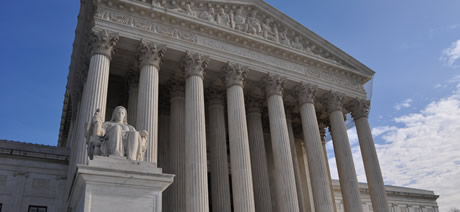National
Supreme Court set to hear oral arguments on marriage
Attorneys in Prop 8, DOMA cases prepare for next week’s showdown


All eyes will be on the Supreme Court next week when it hears arguments in the Prop 8 and DOMA cases. (Washington Blade photos by Michael Key)
At a time of intense national debate, the U.S. Supreme Court for the first time ever will hear oral arguments next week on whether marriage rights for gay couples are protected under the U.S. Constitution.
Attorneys on both sides will make their arguments in two separate cases, on two separate days and regarding two separate anti-gay measures, but the state of marriage equality across the country could be altered depending on the rulings in either of the cases.
On Tuesday, the court will hear arguments on Proposition 8, a ballot measure approved by California voters in 2008 that stripped away existing marriage rights in the state for same-sex couples. The next day, the court will listen to arguments on the federal Defense of Marriage Act, which prohibits federal recognition of same-sex marriage.
Chris Stoll, a senior staff attorney at the National Center for Lesbian Rights, said the oral arguments provide an opportunity for observers to glean what justices are thinking based on their line of questioning.
“It’s true that appellate courts, I would say, mostly base their decisions on the written submissions on the briefs,” Stoll said. “The main purpose of oral argument is to let the justices have questions that they have answered by the lawyers, and so, what the lawyers come in to say isn’t really the focus; it’s really what the justices want to have answered.”
Mary Bonauto, civil rights director for Gay & Lesbian Advocates & Defenders, said oral arguments are a “filtering process” that provide justices the opportunity to explore possible outcomes of their rulings and persuade each other.
“That’s part of why they’re so active,” Bonauto said. “They’re trying to influence each other’s votes and perspectives on it, and, effectively, argue the case themselves. If you ever read a Supreme Court transcript, it’s usually very difficult to read because there are so many interruptions.”
In the Prop 8 case, known as Hollingsworth v. Perry, Ted Olson, a former solicitor general under President George W. Bush, will argue against the constitutionality of the measure on behalf of the American Foundation for Equal Rights. Based on the legal brief he filed, Olson will likely argue against the merits of Prop 8 on the basis that it violates due process and equal protection of gay plaintiff couples under the U.S. Constitution.
The ban on same-sex marriage will be defended by anti-gay groups, such as ProtectMarriage.com, because California state officials have declined to defend the marriage ban. The lawyer arguing on behalf of the anti-gay measure will likely be private attorney Charles Cooper, who defended Prop 8 during the district court trial in 2010.
Depending on the scope, a ruling in the Prop 8 case in favor of the plaintiffs could be a jackpot for same-sex couples. Justices could affirm the limited ruling from the U.S. Ninth Circuit Court of Appeals, which affected only California; determine that the nine states, including California, that offer domestic partnerships must offer same-sex marriage; or issue a sweeping ruling that brings marriage equality to all 50 states.
In the DOMA case, known as Windsor v. United States, Roberta Kaplan, a New York-based attorney, is set to argue against the constitutionality of the anti-gay law in a coordinated effort with the American Civil Liberties Union. Kaplan’s client is Edith Windsor, an 83-year-old lesbian who was forced to pay $363,000 in estate taxes upon the death in 2009 of her spouse, Thea Spyer, because of DOMA.
James Esseks, director of the ACLU’s LGBT Project, said preparations have been underway for oral arguments, including moot courts where individuals impersonate justices to ask possible questions that the real ones may pose.
“People do that for Supreme Court arguments, people do that for appeals court arguments, people do that for trial court arguments — we’ve done that all along,” Esseks said. “It’s just the normal thing that people do.”
On the other side of the DOMA case will be Paul Clement, another former U.S. solicitor general from the Bush administration. He was hired at a rate of $520 an hour by the House Republican-led Bipartisan Legal Advisory Group to defend DOMA in court.
The stakes in the DOMA case are high as well. A ruling striking down DOMA would have multiple impacts on married gay couples. Among other things, they’d have access to medical leave if their spouses need attention because they’re gravely ill or injured and Social Security survivor benefits would become available.
A ruling that strikes down DOMA would also remove a barrier for gay service members seeking spousal benefits in the wake of “Don’t Ask, Don’t Tell” repeal. According to a report published last month from the Center for American Progress and OutServe-SLDN, the average gay military family pays $5,615 out-of-pocket each year for health care insurance because they aren’t eligible for military coverage known as TRICARE.
Both oral arguments will share a common participant: U.S. Solicitor General Donald Verrilli. Since the Obama administration stopped defending DOMA in court, it has participated in litigation against DOMA and will have speaking time in arguments before the Supreme Court. Similarly, in the wake of filing a friend-of-the-court brief against Prop 8, the Justice Department will also have speaking time to argue against it thanks to a request.
In either or both cases, the Supreme Court could determine as part of its ruling that laws related to sexual orientation should be subject to heightened scrutiny, or a greater assumption they’re unconstitutional. That’s the view the Justice Department has articulated in legal briefs against DOMA and Prop 8.
Such a decision would also have a sweeping impact because it would create a precedent that guides other courts when evaluating the constitutionality of anti-gay laws, such as bans on same-sex marriage.
But the merits issue — the question of whether Prop 8 and DOMA are constitutional — will only form part of the discussion in the cases as other issues such as standing and jurisdiction must be addressed. These issues may ultimately form the basis of the court’s rulings.
In the Prop 8 case, the question is whether proponents of the measure have standing to defend the measure in court. It’s possible — as Olson and his team have argued — the court would rule they lack standing because they aren’t harmed by Prop 8. Such a ruling would leave unanswered questions about the constitutionality of same-sex marriage in California, but likely restore same-sex marriage in that state.
The questions about standing and jurisdiction in the DOMA case are more complex. The court asked attorneys when taking up the case whether BLAG has standing to participate and whether the Obama administration’s agreement with lower courts that DOMA is unconstitutional deprives the Supreme Court of jurisdiction. It’s unclear what the fate of DOMA would be if the court decides to rule on those grounds.
GLAD’s Bonauto said she thinks the stronger argument is the court has jurisdiction to consider DOMA and will decide on the merits — but noted “they asked the question for a reason” and questions emerge if the court decides to rule on DOMA on the basis of standing.
“Most people think the Second Circuit decision goes away, then the question is what happens to the district court ruling,” Bonauto said. “Does Edie get her money back, or is there an argument that the district court ruling goes away because the U.S. switched positions in the district court. I’d like to think, at a minimum, Edie would get her money back.”
Vicki Jackson, a Harvard law professor hired by the court, will argue BLAG doesn’t have standing in the lawsuit and the court doesn’t have jurisdiction to hear the case. Deputy Solicitor General Sri Srinavasan is set to address the standing issue on behalf of the Justice Department. BLAG also has been allocated time to assert it has standing in the case, but Windsor’s attorneys weren’t granted time to talk about jurisdiction or standing.
NCLR’s Stoll said any decision from justices that would extend rights to gay couples — whether on the merits or through issues of standing — would be a “milestone” for the LGBT community.
“We have already been seeing tremendous changes in society and the level of acceptance for gay and lesbian people and for legal recognition of them through marriage,” Stoll said. “I think that if the Supreme Court ruled in whatever way in favor of the plaintiffs in these cases, that it would be a real milestone and landmark moment for our movement.”
U.S. Military/Pentagon
Air Force rescinds rule barring inclusion of preferred pronouns in email signatures
Conflict with language in military funding package may explain reversal

The U.S. Air Force has issued a “directive to cease the use of ‘preferred pronouns’ (he/him, she/her, or they/them) to identify one’s gender identity in professional communications,” according to a report published in the Hill on Wednesday.
The rule, which applies to both airmen and civilian employees, was first adopted on Feb. 4 pursuant to President Donald Trump’s anti-transgender executive order called, “Defending Women from Gender Ideology Extremism and Restoring Biological Truth to the Federal Government.”
Days after the administration’s issuance of that order on the first day of the president’s second term, the Office of Personnel Management instructed agencies across the whole of the federal government to remove pronouns from email signatures and enforce the policy barring employees from using them.
Additionally, on Jan. 27 Trump published an order barring trans people from joining the U.S. Armed Forces, indicating that those who are currently in serving would be separated from the military. The Pentagon is fending off legal challenges to the ban in federal courts.
Particularly given the extent of the new administration’s efforts to restrict the rights of trans Americans and push them out of public life, the Air Force’s reversal of the pronoun guidance was surprising.
According to reporting in Military.com, the move might have come because officials concluded the rule was in conflict with language in the military appropriations funding legislation passed by Congress in 2023.
The NDAA established that the defense secretary “may not require or prohibit a member of the armed forces or a civilian employee of the Department of Defense to identify the gender or personal pronouns of such member or employee in any official correspondence of the Department.”
The White House
USCIS announces it now only recognizes ‘two biological sexes’
Immigration agency announced it has implemented Trump executive order

U.S. Citizenship and Immigration Services on Wednesday announced it now only “recognizes two biological sexes, male and female.”
A press release notes this change to its policies is “consistent with” the “Defending Women from Gender Ideology Extremism and Restoring Biological Truth to the Federal Government” executive order that President Donald Trump signed shortly after he took office for the second time on Jan. 20.
“There are only two sexes — male and female,” said DHS spokesperson Tricia McLaughlin in a statement. “President Trump promised the American people a revolution of common sense, and that includes making sure that the policy of the U.S. government agrees with simple biological reality.”
“Proper management of our immigration system is a matter of national security, not a place to promote and coddle an ideology that permanently harms children and robs real women of their dignity, safety, and well-being,” she added.
The press release notes USCIS “considers a person’s sex as that which is generally evidenced on the birth certificate issued at or nearest to the time of birth.”
“If the birth certificate issued at or nearest to the time of birth indicates a sex other than male or female, USCIS will base the determination of sex on secondary evidence,” it reads.
The USCIS Policy Manuel defines “secondary evidence” as “evidence that may demonstrate a fact is more likely than not true, but the evidence does not derive from a primary, authoritative source.”
“Records maintained by religious or faith-based organizations showing that a person was divorced at a certain time are an example of secondary evidence of the divorce,” it says.
USCIS in its press release notes it “will not deny benefits solely because the benefit requestor did not properly indicate his or her sex.”
“This is a cruel and unnecessary policy that puts transgender, nonbinary, and intersex immigrants in danger,” said Immigration Equality Law and Policy Director Bridget Crawford on Wednesday. “The U.S. government is now forcing people to carry identity documents that do not reflect who they are, opening them up to increased discrimination, harassment, and violence. This policy does not just impact individuals — it affects their ability to travel, work, access healthcare, and live their lives authentically.”
“By denying trans people the right to self-select their gender, the government is making it harder for them to exist safely and with dignity,” added Crawford. “This is not about ‘common sense’—it is about erasing an entire community from the legal landscape. Transgender, nonbinary, and intersex people have always existed, and they deserve to have their identities fully recognized and respected. We will continue to fight for the rights of our clients and for the reversal of this discriminatory policy.”
Federal Government
Mass HHS layoffs include HIV/AIDS prevention, policy teams
Democratic states sue over cuts

Tuesday began a series of mass layoffs targeting staff, departments, and whole agencies within the U.S. Department of Health and Human Services under Secretary Robert F. Kennedy Jr., who reportedly plans to cut a total of 10,000 jobs.
On the chopping block, according to reports this week, is the Office of Infectious Disease and HIV/AIDS Policy. A fact sheet explaining on the restructuring says “a new Administration for a Healthy America (AHA) will consolidate the OASH, HRSA, SAMHSA, ATSDR, and NIOSH, so as to more efficiently coordinate chronic care and disease prevention programs and harmonize health resources to low-income Americans.”
The document indicates that “Divisions of AHA include Primary Care, Maternal and Child Health, Mental Health, Environmental Health, HIV/AIDS, and Workforce, with support of the U.S. Surgeon General and Policy team.”
“Today, the Trump administration eliminated the staff of several CDC HIV prevention offices, including entire offices conducting public health communication campaigns, modeling and behavioral surveillance, capacity building, and non-lab research,” said a press release Tuesday by the HIV + Hepatitis Policy Institute.
The organization also noted the “reassignments” of Jonathan Mermin, director of the National Center for HIV, Viral Hepatitis, STD, and TB Prevention, and Jeanne Marrazzo, director of the National Institutes of Health’s National Institute of Allergy and Infectious Diseases. Both were moved to the Indian Health Service.
“In a matter of just a couple days, we are losing our nation’s ability to prevent HIV,” said HIV + Hepatitis Policy Institute Executive Director Carl Schmid. “The expertise of the staff, along with their decades of leadership, has now been destroyed and cannot be replaced. We will feel the impacts of these decisions for years to come and it will certainly, sadly, translate into an increase in new HIV infections and higher medical costs.”
The group added, “We are still learning the full extent of the staff cuts and do not know how the administration’s announced reorganization of HHS will impact all HIV treatment, prevention, and research programs, including President Trump’s Ending the HIV Epidemic initiative,” but “At the moment, it seems that we are in the middle of a hurricane and just waiting for the next shoe to drop.”
A group of 500 HIV advocates announced a rally planned for Wednesday morning at 8 a.m., at the U.S. Capitol lawn across from the Cannon House Office Building, which aims to urge Congress to help stop the cuts at HHS.
“Over 500 advocates will rally on Capitol Hill and meet with members of Congress and Hill staff to advocate for maintaining a strong HIV response and detail the potential impact of cuts to and reorganization of HIV prevention and treatment programs,” the groups wrote.
The press release continued, “HHS has stated that it is seeking to cut 10,000 employees, among them 2,400 CDC employees, many doing critical HIV work. It also seeks to merge HIV treatment programming into a new agency raising concerns about maintaining resources for and achieving the outstanding outcomes of the Ryan White HIV/AIDS Program.”
On Tuesday a group of Democratic governors and attorneys general from 23 states and D.C. filed a lawsuit against HHS and Kennedy seeking a temporary restraining order and injunctive relief to halt the funding cuts.
U.S. Centers for Disease Control and Prevention withdrew approximately $11.4 billion in funding for state and community health departments during the COVID-19 pandemic response, along with $1 billion to the Substance Abuse and Mental Health Services Administration.
“Slashing this funding now will reverse our progress on the opioid crisis, throw our mental health systems into chaos, and leave hospitals struggling to care for patients,” New York Attorney General Letitia James said.
-

 District of Columbia11 hours ago
District of Columbia11 hours agoWorldPride organizers may warn trans people from abroad not to attend event
-

 Music & Concerts5 days ago
Music & Concerts5 days agoKylie brings ‘Tension’ tour to D.C.
-

 District of Columbia2 days ago
District of Columbia2 days agoLocal officials weighing impact of Trump’s D.C. executive order
-

 South Africa4 days ago
South Africa4 days agoUS-funded South African LGBTQ groups curtail operations










